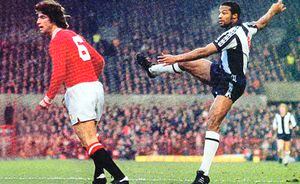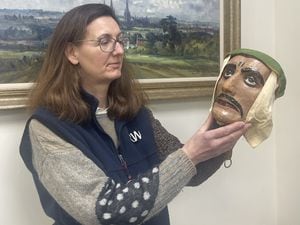Comment: Cyrille Regis deserves nationwide recognition
At least the Premier League saw sense, eventually, and hastily organised a tribute to Cyrille Regis.

There will be black armbands and a minute’s applause to the former Albion striker at all top tier games this weekend.
But the fact the English Football League decided against a nationwide tribute for its 72 clubs is nothing short of disgraceful.
Let’s not forget, Regis only scored one goal in the Premier League, all the others were in the Football League.
He wasn’t just a glorious goalscorer though, he was the most culturally important player of the 20th century.
A talisman who transcended the sport and affected British society as a whole, he was an icon who literally changed the face of the game from almost all-white to one that was black, brown, or anything in between.
All of this has been covered in these pages this week, but for some reason the football authorities needed to be reminded of it right up until yesterday morning.
It was only after media pressure and a discreet phone call to league chief Richard Scudamore from Gordon Taylor, chief executive of the Professional Footballers’ Association, that the Premier League finally acted.
Taylor has been criticised by Albion fans in the past for his insufficient response to the Astle family’s continued campaign into dementia in football, but he deserves credit in this case.
He also called Shaun Harvey of the EFL, but there was no countrywide tribute from that governing body.
It’s not the first time Harvey, the man behind the farcical Checkatrade Trophy and League Three proposals, has misjudged the mood.
Nationwide tributes are rare, but history suggests Regis is more deserving than others who have been recognised.
In 2013, there was a minute’s applause for Nelson Mandela. In 2005, there was one for George Best.
Perhaps Regis didn’t do as much for black rights globally as Mandela, and perhaps he wasn’t as good at football as George Best (although plenty in these parts would disagree with the latter statement).
But the fact he came close to both of them in their respective spheres deserves at least equal recognition.
Mandela had no impact on football, and Cyrille’s legacy is far more worthy than Best’s.
The Northern Irishman may have captured the hearts of supporters with his playboy lifestyle, but Cyrille’s impact on the game means today, a third of Britain’s professional footballers are either black or of an ethnic minority.
The EFL’s decision and the Premier League’s initial failure to grasp the gravity of the man is also indicative of an institutional regionalism.
It’s hard to believe there would have been such an oversight had Regis and the Three Degrees played for Liverpool, Manchester United, or one of the London clubs.
Regis, humble to the last, would probably not have wanted such a furore to overshadow the first week of his passing.
But for those millions of people – and it is millions – who were touched by the way he conducted himself both on and off the pitch, it is important.
No doubt his admirers among the 72 clubs will pay tribute anyway, but it’s a shame the governing body is too short-sighted to initiate the nationwide moment of celebration he so obviously deserves.
Regardless of what official tributes men in white shirts and ties have organised, you can bet at least a third of the country’s professional footballers will have him in their minds this weekend.
A great swathe of supporters will do too – still in awe of him after all these years.





